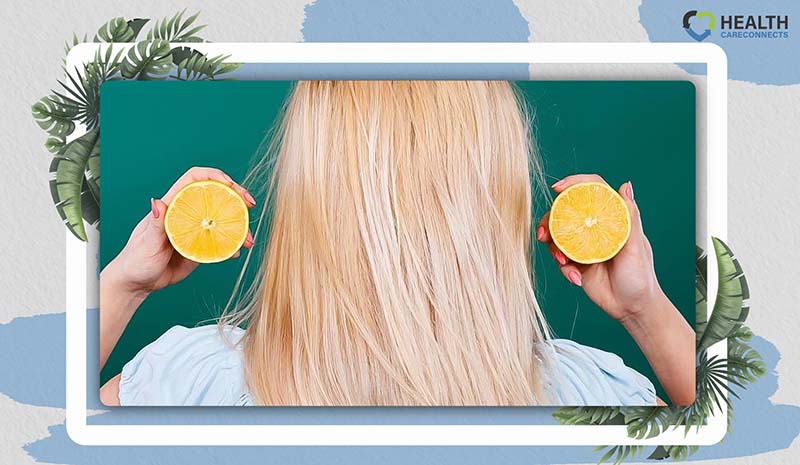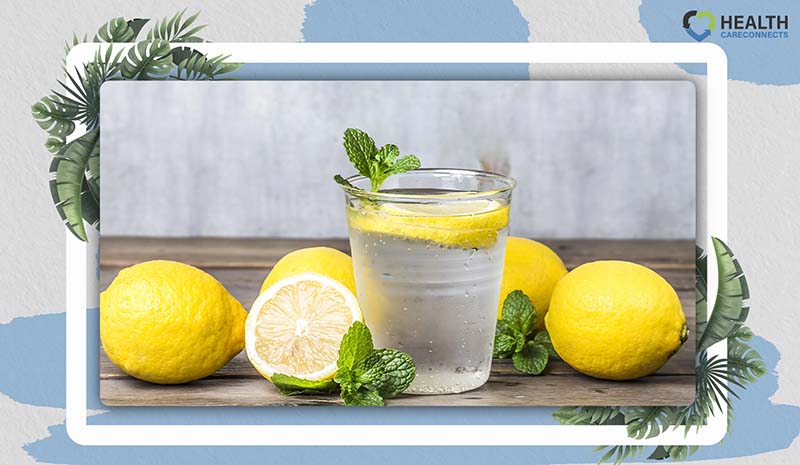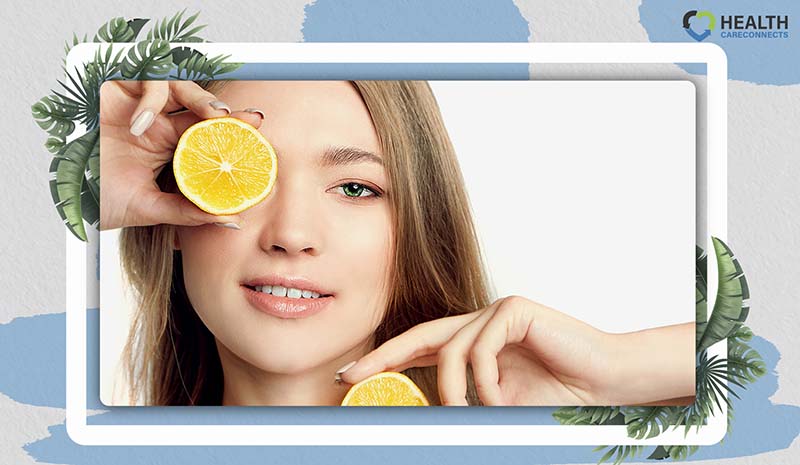Is lemon good for hair? Lemon, a common citrus fruit, is not only perfect for adding zest to your dishes but also offers impressive benefits for your hair.
Research reveals that compounds like limonin in lemons can stimulate hair growth by activating scalp processes that combat hair loss. Furthermore, lemon polyphenols (LPPs) provide anti-aging benefits, improving hair health, delaying hair loss, and reducing hair coarseness.
Many also praise lemon juice for its ability to tackle dandruff and enhance hair texture. Let’s explore how lemon can be a great addition to your hair care routine.
Is Lemon Good for Hair?
Lemon juice may not be the first hair treatment you think of, but it’s packed with nutrients and antioxidants. Loaded with citric acid, ascorbic acid, iron, potassium, calcium, phosphorus, and essential oils like limonene and linalool, along with a variety of flavonoids, lemon juice offers numerous benefits.
These ingredients can significantly aid in promoting hair growth and addressing common issues such as dandruff, hair loss, excessive oiliness, split ends, and other scalp inflammations.
Regular application of lemon juice can enhance the shine and overall appearance of your hair. This is largely due to how these active compounds interact with the hair follicles and the proteins in your hair strands, fostering a healthier scalp and stronger hair.

7 Benefits of Using Lemon on Hair
Lemon is celebrated not only for its culinary uses but also for its remarkable benefits for hair health. Here are some benefits of incorporating lemon into your hair care routine:
Scalp Health Booster
Lemon juice is excellent for scalp care. It regulates oil production, creating a balanced environment that discourages the growth of dandruff-causing fungi.
For those with dry scalps, lemon provides essential hydration, easing itchiness and reducing flaking. Its antifungal properties are also effective in preventing and treating scalp acne, promoting a clear and healthy scalp environment.
Anti-dandruff Solution
Persistent dandruff can be both frustrating and embarrassing, but lemon juice offers a natural remedy. Its antifungal and cleansing qualities target the root causes of dandruff, such as excess oil and fungal growth.
A scrub made from lemon juice and olive oil can exfoliate the scalp, clearing away dead skin and product buildup that lead to flaking. The citric acid in lemon also helps in absorbing excess oil, particularly useful in managing seborrheic dermatitis.

Natural Hair Shine Enhancer
Lemon is a boon for those dealing with rough or curly hair. Limonene in lemons helps rejuvenate dry, frizzy, and coarse hair, giving it a healthier appearance. Lemon juice is packed with antioxidants and essential nutrients that maintain hair smoothness and health.
High levels of folic acid and vitamin C enhance its effectiveness in boosting hair vitality, while also reducing oiliness for a silky, lustrous finish.
Oily Hair Combatant
For individuals struggling with oily hair, lemon juice can be transformative. Its astringent properties help control excess oil production, making hair look less greasy and more voluminous.
By balancing scalp oil levels, lemon juice can extend the periods between washes, thereby reducing the need for frequent shampooing which might strip essential oils and exacerbate oiliness.
Natural Hair Fragrance
Beyond its cleansing and nourishing benefits, lemon juice leaves a delightful natural fragrance.
Its citrusy scent is refreshing and uplifting, adding a pleasant touch to your hair care routine without the overwhelming nature of synthetic fragrances.
Hair Strengthener
Lemon juice is rich in vitamin C, which stimulates collagen production, essential for hair growth and strength.
It also contains antioxidants and nutrients like folic acid that nourish hair follicles and protect them from damage. Regular use of lemon juice can strengthen your hair from the roots, reducing breakage and enhancing overall hair health.
Gentle Hair Cleanser
As a natural cleanser, lemon juice effectively removes dirt, oil, and product buildup without harsh chemicals.
Its acidic nature clarifies the scalp and hair follicles, revitalizing your hair and maintaining its natural oils. This makes lemon juice a gentle and effective cleansing option for all hair types.
Instructions for Using Lemon Juice for Hair Care
Lemon juice offers a variety of versatile applications for promoting hair growth and enhancing hair health. Here are several effective methods to integrate lemon juice into your hair care regimen:
- Hair Rinse: Creating a hair rinse with lemon juice can rejuvenate your hair instantly. Mix 1/4 cup of lemon juice with warm water and pour it over your hair after shampooing. Massage it thoroughly into your hair and scalp before rinsing it out at the end of your shower for a refreshing cleanse.
- Hair Mask: For a nourishing hair mask, combine the juice from half a lemon with 1 egg and 1 teaspoon of olive oil. Mix these ingredients well and apply to wet hair. Ensure the mixture is evenly distributed through your strands. Let the mask sit for 20-30 minutes before rinsing with warm water and gently patting your hair dry.
- Scalp Cream: Prepare a scalp cream by mixing 1 tablespoon of olive oil with either 5 drops of lemon essential oil or 1/4 cup of lemon juice. Massage this blend into your scalp thoroughly. Leave it on for 1-2 hours, or overnight for intensive treatment. Rinse off thoroughly in the morning to help reduce scalp inflammation and promote health.
- Castor Oil: Combine castor oil with lemon juice for a tried-and-tested remedy for dandruff and other scalp inflammations. This mixture helps soothe the scalp and reduce flakiness.
- Olive Oil: Olive oil serves as an excellent carrier for lemon juice, helping to soften its acidity. This combination is beneficial for your hair, especially if you are looking to minimize potential irritation from the lemon juice.
- Aloe Vera: Mixing lemon juice with aloe vera gel forms a potent antioxidant duo that protects hair from breakage and helps to reduce split ends. This blend is particularly effective for improving hair elasticity and strength.
- Honey: Combining honey with lemon juice creates a powerful hair mask that can strengthen your hair, decrease oiliness, and enhance its luster. Honey’s natural properties complement lemon’s nutrients, making it an ideal carrier for maximizing benefits.
Benefits of Drinking Lemon Water for Hair Health
Lemons are renowned for their health-promoting properties, enriched with vitamin C, soluble fiber, and potent plant compounds. Despite the lack of solid scientific proof linking lemon juice directly to enhanced hair health, its benefits in other health aspects are well-documented. Research highlights lemons’ ability to assist in weight loss, diminish the risk of heart disease, combat anemia, prevent kidney stones, and improve digestive health. There are also anecdotal reports suggesting lemons might play a role in cancer prevention.
While specific studies validating lemon juice’s direct impact on hair health are absent, integrating lemons into your diet remains advantageous due to their established health benefits. Regular consumption of fresh lemon juice could contribute to overall well-being and might indirectly benefit hair health, though further research is needed to confirm these effects.

How Often Should You Use Lemon Juice on Your Hair?
Lemon juice can be an effective remedy for dandruff when applied directly to the scalp, due to its antifungal and antibacterial properties. However, moderation must be maintained because using too much lemon juice can lead to dry hair.
For optimal results without risking hair damage, it is advisable to apply lemon juice to your hair and scalp no more than twice a week. This frequency helps leverage lemon juice’s dandruff-fighting benefits while preventing the potential adverse effects of overuse, keeping your hair and scalp well-hydrated and healthy.
Overusing lemon juice on your hair and scalp can result in dryness, increased frizziness, and brittleness. To preserve the health and appearance of your hair, balance your use of lemon juice with regular hair care treatments, ensuring that you don’t rely too much on this natural treatment.

Potential Side Effects of Lemon Juice on Hair
Lemons are often cited for their potential benefits in treating dry skin and dandruff due to their natural antibacterial properties. However, caution is necessary, particularly for those with sensitive skin conditions like eczema or psoriasis. The citric acid in lemons is potent and can cause skin irritation. If you notice redness, increased irritation, or itchiness, it is advisable to stop using lemon juice immediately.
Additionally, lemons can trigger a contact reaction known as phytophotodermatitis, a condition resulting from exposure to certain plant compounds followed by sunlight exposure. This reaction is characterized by inflammation, blisters, and subsequently, dark pigmentation spots on the skin that may persist for several weeks.
Besides lemons, other common culprits include oranges, parsley, and parsnips. While this condition does not directly affect hair, it can impact the scalp, especially if exposed to sunlight after applying these substances.
Conclusion
Many wonder, “Is lemon good for hair?” Indeed, lemon juice offers numerous potential benefits for your hair. It can naturally lighten your hair, enhance its shine, and reduce oiliness and dandruff, contributing to overall improved scalp health. However, caution is necessary as using too much lemon juice or applying it incorrectly can lead to hair damage, skin irritation, and other adverse reactions.
Start by diluting the lemon juice, performing a patch test on your skin to check for any sensitivity, limiting sun exposure after application, and taking good care of your hair post-use. These steps will help you harness the positive aspects of lemon for your hair while avoiding any potential side effects.
For those seeking more information and honest product reviews, I recommend visiting HealthCareConnect.

Dr. Joyce Slater: Your Guide to Informed Health Choices
Dr. Joyce Slater shines as a distinguished expert in the field of nutrition and public health. Contributing her vast expertise to HealthConnectbc, she embodies a deep-seated passion for enhancing public well-being. As a respected figure in her field. Dr. Slater’s academic journey and professional achievements are nothing short of inspirational.
Holding a significant position as a researcher and educator, Dr. Slater has delved deeply into the intricacies of food literacy and nutritional science. Her work, prominently featured in numerous esteemed scientific publications, underscores her dedication to expanding our understanding of food’s role in health and society.
At the heart of Dr. Slater’s professional ethos is a profound desire to positively impact individual lives through education and research. She often says, “Empowering people with the knowledge to make healthier choices is the most rewarding aspect of my work.” This principle is the cornerstone of her involvement with HealthConnectbc, where she strives to provide reliable and practical health advice.
Dr. Slater’s contributions to HealthConnectbc are multifaceted: academically, she offers insights into the complex world of nutrition and health, enhancing both public understanding and professional practices. Additionally, she is instrumental in guiding and inspiring the next generation of health professionals, thus fostering future excellence in the field.
Juggling rigorous research with her educational duties, Dr. Slater demonstrates an unwavering commitment to her profession. Her approachable nature and genuine concern transcend the confines of academia, touching the lives of everyone she interacts with. Dr. Slater looks forward to continuing her journey of discovery and education, dedicated to the ongoing improvement of public health and nutrition.
At HealthConnectbc, Dr. J. Slater is not just a contributor; she is a guiding light, dedicated to enlightening and motivating individuals towards a healthier and more informed lifestyle.
PUBLISHED ARTICLES
- Food literacy competencies: A conceptual framework for youth transitioning to adulthood (2018)
- Self-perceived eating habits and food skills of Canadians (2016)
- Challenges to acquiring and utilizing food literacy: Perceptions of young Canadian adults (2016)
- Socio-demographic and geographic analysis of overweight and obesity in Canadian adults (2009)
- Sustainable well-being: Concepts, issues, and educational practices (2014)

